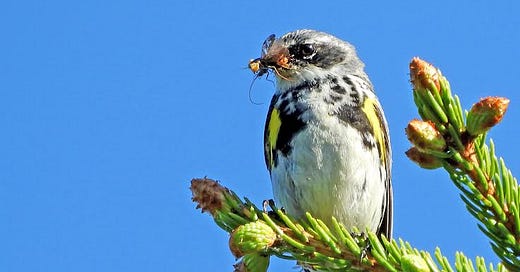Yellow Rumped Warbler, Bill Gette photo.
Why Do Birds Migrate?
Birds, Bugs and Daylight
On a recent trip to the Connecticut Lakes in northern New Hampshire I was struck with the huge number of insects. Almost every bird we saw had five or six insects grasped tightly in its bill.
Thus laden the birds would swoop down from the high trees to nests hidden in the underbrush. They would continue this fly catching behavior from dawn to dusk, which is about 15 hours in the summer in northern New Hampshire.
The birds could have just as easily stayed in the tropics where food and nesting sites are also abundant. But where they would only have 12 hours to feed their chicks and their prey would only have 12 hours a day copulate, pupate and lay their own eggs.
The extra three hours of summer sunlight allows migrating birds to shave several days off the amount of time when their newly hatched chicks when are most vulnerable because they can’t fly.
In the crapshoot that is evolution, such an advantage is more than enough to drive birds’ migrations farther and farther north.





From: PBS, https://www.pbs.org/wgbh/evolution/library/faq/cat01.html#.
.Is evolution a random process?
Evolution is not a random process. The genetic variation on which natural selection acts may occur randomly, but natural selection itself is not random at all. The survival and reproductive success of an individual is directly related to the ways its inherited traits function in the context of its local environment. Whether or not an individual survives and reproduces depends on whether it has genes that produce traits that are well adapted to its environment.